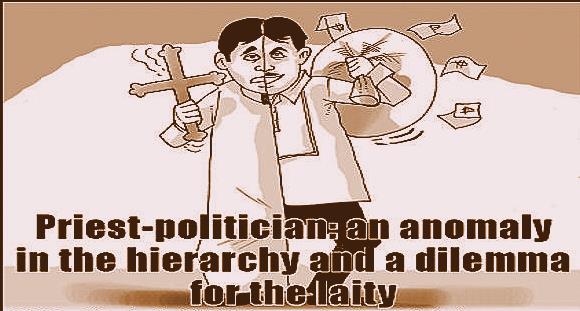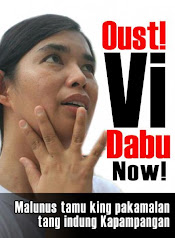Defrock
“I will go back to my priestly duties. To run for re-election in Pampanga. Or Senator. Or President. If “If it is God’s will”. The last three are the options we hear a priest politician say when asked about his future political plans. The first option, meaning a return to priesthood, this priest politician claim will always be open for him. But should it?
When then priest now Governor Eddie T. Panlilio ran for public office in 2007, Apung Ceto Aniceto as his bishop suspended him from performing his priestly duties as a punishment for violating the Canon Law (285 Sec. 3 – Forbidding all ordained personnel from holding any public office). Then and even now, such willful disobedience of Panlilio receive severe criticism from some members of the Catholic clergy, the loudest and most consistent of all is Archbishop Oscar Cruz of Dagupan. I think the archbishop’s statements were meant to defend the sanctity of the Church’s laws and to protect it from the brunt (division and reservations from the Catholic clergy and faithful, among countless others) brought on by Panlilio’s continuing offense. Besides, as his former secretary, the archbishop knew Panlilio very well.
I am not a Canon lawyer, or a secular one for that matter, so I now wonder and is quite troubled about these things: if somebody commits another one of the same offense, that is, a repeat offender or a recidivist, would not his penalty be more severe than that of his first offense being as such that the offender was not reformed or renewed, that he is obviously not repentant of his sin? Concretely, should Governor Panlilio dare run again in 2010 for whatever public position, what would then his more severe punishment be?
Kung gagawin niya ito the second time around, tahasan na niyang lalabagin ang batas ng simbahan. Either magkusa na syang umalis sa pagkapari o sigurado siyang ititiwalag ng simbahan. Dismissal from the Clerical state (Canons 1333-1338 CIC) ang tawag dito, o to defrock sa mas simpleng katawagan.
To become a Catholic priest, one must swear by his Vow of Obedience. He will live by this vow as a proof of his vocation and his obedience even until death to God, the Church and the people.
When he was ordained as a priest, he made a consecrated promise to his bishop. This is called the Promise of Obedience. This is how the sacred rite goes:
PROMISE OF OBEDIENCE
The candidate goes to the bishop and, kneeling before him, places his joined hands between those of the bishop. If this gesture seems less suitable in some places, the conference of bishops may choose another gesture or sign.
If the bishop is the candidate’s own Ordinary, he asks:
Do you promise respect and obedience to me and my successors?
Candidate: I do.
If the bishop is not the candidate’s own Ordinary, he asks:
Do you promise respect and obedience to your Ordi nary?
Candidate: I do.
Bishop: May God who has begun the good work in you bring it to fulfillment.
The first time he ran for public office, Panlilio broke his promise to his Bishop and essentially, to God, the Church and the people. But his brazen declaration of late that he will again run for public office while he is still a priest is even worst. To some, his use (abuse) of “God’s will” as his ultimate line of defense, to justify his next political step is unspeakable. How will Apung Ceto decide what is the will of the Supreme Almighty and the will of the disobedient priest? Is not the Canon Law, being the Universal law of the Church, a concrete expression of God’s will for priests? Besides, how can God prohibit something but then exempt Panlilio?
Panlilio, now as a governor, fight tooth and nail for the “rule of law” to prevail, invoking on the Local Government Code, the Criminal Code (for his Libel, Perjury and other cases) Election Code, Civil Service Code and other such codes. If he, as a priest, held the Canon Law with the same fiery fervor, would he had ran for public office then? And if he, at all, being still a priest, albeit suspended, has some reverence left for the Canon Law and the Church, would he still act the way he does now? I would say NO. Perhaps the priestly calling in Panlilio has gone on and left him in the same manner that he had left his priestly duties as he transgressed against the Canon Law? Somebody please enlighten me on this, as I pray it not be so.
Among Ed, e ka suguro pa ……
What I want to say is, Among Ed, without wanting to be bastos or irreverent, please do not always invoke the words IF GOD IS WILLING, kasi mukhang hindi naman yung universal God ang kausap mo.








